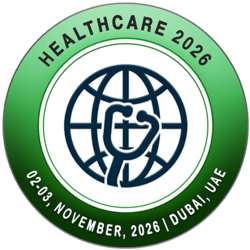Healthcare and Medical Technologies will explore the latest innovations in medical devices, digital health solutions, and AI-driven healthcare tools. It will cover advancements in telemedicine, wearable technologies, electronic health records, and precision medicine, emphasizing their role in improving patient outcomes, accessibility, and efficiency in healthcare delivery.
The Global Health and Internal Medicine session explores the intersection of global health challenges and advancements in internal medicine. It highlights strategies to address non-communicable diseases, infectious diseases, and healthcare disparities, emphasizing innovative diagnostic and treatment approaches. The session fosters discussions on multidisciplinary care models and policies for improving global health equity.
Advanced Healthcare and Innovations will explore cutting-edge advancements in healthcare, focusing on the transformative technologies and innovations that are reshaping the medical landscape. By addressing emerging trends in healthcare delivery, technology integration, and patient care, the session aims to highlight solutions that improve outcomes, streamline processes, and enhance the overall efficiency of healthcare systems.
Mental health is an essential aspect of overall well-being, influencing how individuals think, feel, and act. Mental health disorders encompass a wide range of conditions that affect mood, behavior, and cognitive functions, disrupting the individual’s ability to cope with daily life. Addressing these disorders is crucial for improving quality of life and reducing the stigma associated with mental illness.
Public Health and Nutrition focuses on the essential role of nutrition in public health, highlighting the global challenges, strategies for improving dietary habits, and the implications of malnutrition on health systems. Nutrition plays a key role in preventing diseases, promoting well-being, and reducing healthcare costs. As the world faces rising rates of non-communicable diseases (NCDs) and other nutrition-related health issues, public health strategies are critical to addressing these challenges.
Women’s Healthcare, Gynecology, and Obstetrics will delve into the latest developments and essential practices in women's healthcare, focusing on gynecology and obstetrics. It will address various aspects of women's health, including preventive care, common gynecological issues, advancements in obstetric care, and the integration of multidisciplinary approaches for optimal health outcomes.
Diabetes management is crucial to preventing complications and improving quality of life. This session covers the latest strategies in managing and treating diabetes, focusing on lifestyle interventions, pharmacological treatments, and emerging therapies.
Non-communicable diseases (NCDs), such as heart disease, diabetes, chronic respiratory diseases, and cancer, represent a growing global health burden. They are the leading cause of death worldwide and are primarily linked to lifestyle factors, including poor diet, lack of physical activity, and tobacco and alcohol use. The prevention and management of NCDs require a multi-faceted approach involving public health strategies, individual behavior changes, and healthcare interventions.
Healthcare systems are essential for ensuring the well-being of populations. Efficient healthcare management ensures access to high-quality care, improves patient outcomes, and promotes sustainable health practices across communities. The effective operation of these systems requires a balance between healthcare providers, administrators, policymakers, and patients.
Infectious diseases remain a significant global health challenge, causing widespread morbidity and mortality. This session explores the latest research, trends, and strategies in managing infectious diseases, with a focus on innovative preventive measures and public health interventions to mitigate risks.
Clinical medicine continues to evolve, driven by groundbreaking research and technological advancements. This session explores key developments shaping the future of patient care, focusing on innovative diagnostics, therapies, and patient-centric practices.
Gastroenterology and Hepatology will delve into the latest advancements and challenges in gastroenterology and hepatology, focusing on the diagnosis, treatment, and management of gastrointestinal and liver disorders. The topics will explore innovative research, clinical practices, and emerging trends in these fields.
The field of surgery and treatment protocols is evolving rapidly, driven by technological advancements, novel therapeutic approaches, and an increasing focus on patient-centric care. This session delves into the latest innovations shaping modern healthcare, emphasizing minimally invasive techniques, personalized medicine, and digital solutions that are transforming surgical practices and treatment outcomes.
The session on Healthcare and Nursing will delve into the evolving dynamics of global healthcare systems and the pivotal role nursing professionals play in ensuring quality care. It aims to provide an interdisciplinary platform for discussing innovations, challenges, and emerging trends in healthcare delivery and nursing practices.
Translational healthcare and pharmaceuticals focus on bridging the gap between laboratory research and clinical application, ensuring that scientific discoveries are translated into tangible therapies and treatments. This session will explore advancements in translating innovations from bench to bedside, with an emphasis on improving patient care, accelerating drug development, and enhancing therapeutic outcomes.
Orthopedics focuses on the diagnosis, treatment, and prevention of musculoskeletal disorders, including bones, joints, muscles, tendons, and ligaments. Osteoporosis, a condition where bones become brittle and fragile due to a loss of tissue, is a key area of concern in orthopedics. This session aims to provide a comprehensive overview of both topics, highlighting the latest advancements, challenges, and treatment options.
This session focuses on the critical need for equitable healthcare access and quality for individuals with disabilities. With approximately 15% of the global population experiencing some form of disability, healthcare systems must adapt to address their unique needs. The session will explore practical strategies, policy innovations, and technological advancements to foster inclusivity.
Scientific Highlights
- Healthcare and Medical Technologies
- Global Health and Internal Medicine
- Advanced Healthcare and Innovations
- Mental Health and Psychological Disorders
- Public Health and Nutrition
- Women’s Healthcare, Gynecology and Obstetrics
- Diabetes Management and Treatment
- Non-Communicable Diseases (NCDs): Prevention and Management
- Healthcare System and Management
- Infectious Diseases and Preventive Measures
- Advances in Clinical Medicine
- Gastroenterology and Hepatology
- Innovations in Surgery and Treatment Protocols
- Healthcare and Nursing
- Translational healthcare and Pharmaceuticals
- Orthopedics and Osteoporosis
- Disability in Healthcare


